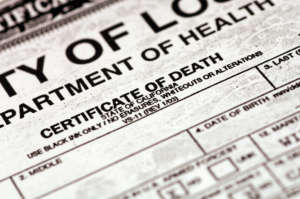Linda sank down into an armchair and pulled off her hat. “I hate funerals and this one was really tough. I am really going to miss Aunt Millie.”
Her sister, Mary, sighed. “I know. But I’m glad we could be there for her, her being all alone after Uncle Fred died.”

“But now the hard work begins,” Linda said. “Aunt Millie gave me the key to her lockbox so we could take care of her estate, but the last thing the administrator at the nursing home said was to get plenty of copies of her death certificate, so we can notify the government and insurance companies about her death.”
“Who do we have to notify?” Mary asked.
“Well, the administrator said we had to notify Social Security and Medi-Cal. But once we notify Social Security, I would think they would take care of that, since both are federal programs. Besides, her obituary was in the paper. I have to believe the local Medi-Cal office monitors that. If they need more, I am sure they will contact us.”
“Wait, doesn’t Medi-Cal try to recover whatever they paid out in benefits?”
“I’ve heard that, but I am sure they do that after we settle the estate and file the final tax forms. Maybe they’ll take money if there’s a refund or something.”
“Okay,” Mary said. “Easy peasy. I like that.”
Typically, when a Medi-Cal recipient dies, the Medi-Cal office in the county where the decedent resides is notified and that office notifies the Department of Health Services in Sacramento. Then benefits are terminated. However, state law also requires that the beneficiary’s estate independently notify the California Department of Health Services. Merely notifying the county Medi-Cal office is not considered proper notice.
Under Section 215 of the California Probate Code, “Where a deceased person has received or may have received health care under [Medi-Cal], or was the surviving spouse of a person who received that health care, the estate attorney, or if there is no estate attorney, the beneficiary, the personal representative, or the person in possession of property of the decedent shall give the Director of Health Care Services notice of the decedent’s death not later than 90 days after the date of death. The notice shall include a copy of the decedent’s death certificate.”
This notice is required to initiate Medi-Cal’s “estate recovery process,” whereby the State seeks to recoup funds expended on a beneficiary’s behalf from their estate. However, the State may only make claims against recipients who were either 55 or older at the time benefits were received or were in a nursing home when benefits were paid, and there is no surviving spouse, registered domestic partner, or minor, blind or disabled child.
As of January 1, 2017, the State may no longer make a claim against an estate unless it is subject to probate. However, that does remove the requirement of prompt notification of a Medi-Cal beneficiary’s death.
Once proper notice of death is received, the State of California has four months to file a claim against an estate or it is forever barred. That’s why formally sending timely notice is so important: it starts the statute of limitations running. If no notice of death is received and the State learns of a beneficiary’s death elsewhere, it may seek recovery at any time, even years after an estate has been settled. At that point, heirs could be required to pay back monies owed Medi-Cal from their inherited share.
Occasionally, the Recovery Unit sends out questionnaires, implying there is a legal obligation to complete the forms and return them. However, when a Medi-Cal recipient, or the spouse of a deceased Medi-Cal beneficiary dies, the only legal obligation an heir or estate administrator has is to provide notice of death and a copy of the death certificate.
Generally, Recovery Unit questionnaires seek to uncover property that remains in a deceased beneficiary’s estate. However, the State is not entitled to that information unless that property exists in the probate estate. Assets such as living trusts, joint tenancies, tenancies, and other revocable interests may all be claimed by the State, but recovery is limited to benefits actually paid or the value of the beneficiary’s estate, whichever is less. When an estate is complex, it is in an estate’s best interests to seek legal counsel before completing and returning any estate recovery forms.
Filing timely notice of a Medi-Cal beneficiary’s death protects a decedent’s heirs from unexpected or unwarranted recovery claims after an estate has been settled. By closing the window to the time in which the State may seek to recover Medi-Cal benefits, a decedent’s heirs can be assured that the monies they receive are theirs to keep.
[Ad] Do you need help with your California estate planning now? We can help. Together our Absolute Trust Counsel team will take a look at your situation and your specific needs to develop a strategic plan to help protect you and your loved ones. Here’s a link to schedule your free discovery today > https://absolutetrustcounsel.com/scheduling/.
If you’re someone who needs to include Medi-Cal planning in your estate plan, we can help. For more information on what Medi-Cal planning should look like, visit https://absolutetrustcounsel.com/practice-areas/medi-cal-planning/ for even more resources to help get you started.




